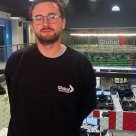Atlantic Canada’s first solar-powered vehicle, developed entirely by engineering students at Dalhousie University, is ready to make its racing debut at an international competition in Topeka, Kansas, next week.

The car, dubbed “NOVA,” will be unveiled alongside others of its kind at the annual Formula Sun Grand Prix, which will see solar vehicle groups from about 20 schools worldwide enlist their projects in the competition.
Amid a process that took nearly three years, Gina Park, the team leader of the Dalhousie Solar Car Team, collaborated alongside a crew of students to produce the car. She said the goal is to excite the public by demonstrating that solar-powered vehicles are possible.
“We can harness energy from solar radiation and then we can power vehicles from it,” she said, speaking from the team’s shop at Dalhousie’s Emera IDEA Building in Halifax.
“We want to execute it in a way that’s exciting to the public and they can think about, like, ‘If a bunch of students can do it then maybe we can nurture it and fund projects that are using this technology that are more environmentally conscious and that have the future of resources in mind.’”
The idea was conceived in the fall of 2020 among a group of engineering students. In February 2021, the group received funding from the dean of the school’s engineering department to attend a solar car conference, where they connected with organizers and participants involved in the industry.
“The project cycle for us on this car spreads over two years,” she said, adding that it took about eight months to collect the necessary funds to launch the building process.
Despite the large number of wires and “random-looking parts” in their workshop, Parks said the concept of the solar car is “very simple.”
“The solar cells behind me collect the solar energy, store it into the battery pack, and the battery powers the motor,” she said while drawing attention to a team member working with a set of wires.
When asked why the crew went with NOVA for the project’s name, the answer was as expected.
“Because we are from Nova Scotia,” Park smiled. “It’s such a pretty name and it was just fitting.”
She said although many have contributed to the lengthy process, the core team is made up of eight students that are handling every aspect of the current engineering and administrative tasks.
The DalSol team has been responsible for organizing fundraising, sponsorships and finalizing shipping documents for the upcoming competition while adding the final touches to the car.
“Accumulating all those hours into a number, I think thousands might be an underestimation,” Park laughed.
The team was able to put some of their hard work to the test on Wednesday, as they took the vehicle for a cruise on a runway provided by Michelin in the nearby community of Waterville, N.S.
“It was a very happy day,” Park said as she mentioned their current workshop is “very restricted” for space, which made the access to a larger, open environment much more fitting for testing out all of the vehicle’s features.
“We were so excited to let the solar car loose on the formal airport runway that Michelin graciously sponsored us with,” she continued. “It was about 750 metres of length that we had access to, and we were able to push the metal to the ground and see how fast the solar came running.”
Park said they successfully completed several ‘zigzag’ and ‘figure-eight’ tests on the strip to assess the vehicle’s ability to execute sharp turns and brake at high speeds.
NOVA is capable of operating comfortably at speeds ranging between 50 and 60 kilometres per hour. But after wrapping up its recent test run, Park said she thinks the solar-powered automobile’s maximum speed is still yet to be fully determined.
“She was still picking speed up after we were finished testing, so I guess we still don’t know the absolute maximum (speed) that she’s able to crank out,” she said.
All of the elements that make NOVA come to life were installed by Dalhousie students at the Halifax campus.
In an interview with Global News Morning on Friday, Park said after the crew finished up their last bit of preparation in the shop, they’ll head home to start packing for their three-day road trip to Kansas.
“We have a big trailer outside right now waiting for us to load up,” she said, adding that the NOVA crew from Halifax will be departing on Saturday morning and will meet with some of the racing crew from different provinces upon their arrival.
Moving forward, Park said lots more will be done to improve the vehicle’s features, but for now, all sights are set on next week’s race.
“For this competition, it’s our debut race so we want to really put ourselves out there,” she said.
Parks said she’s already attended the grand prix on three other occasions, but this will be her first experience as a participant.
Despite it being labelled a “competition,” Park said attendees make up a small group of engineering students, therefore the entire community remains supportive of their peers throughout the race.
“It’s so encouraging because the sportsmanship is so present at the track and we all want each other to succeed,” she said. “People want our team to be there.”
The Electrek Formula Sun Grand Prix is an annual solar-car race that started in 2000 and takes place in Topeka, Kansas. This year’s event runs from June 27 through July 2 at Heartland Motorsports Park.






Comments